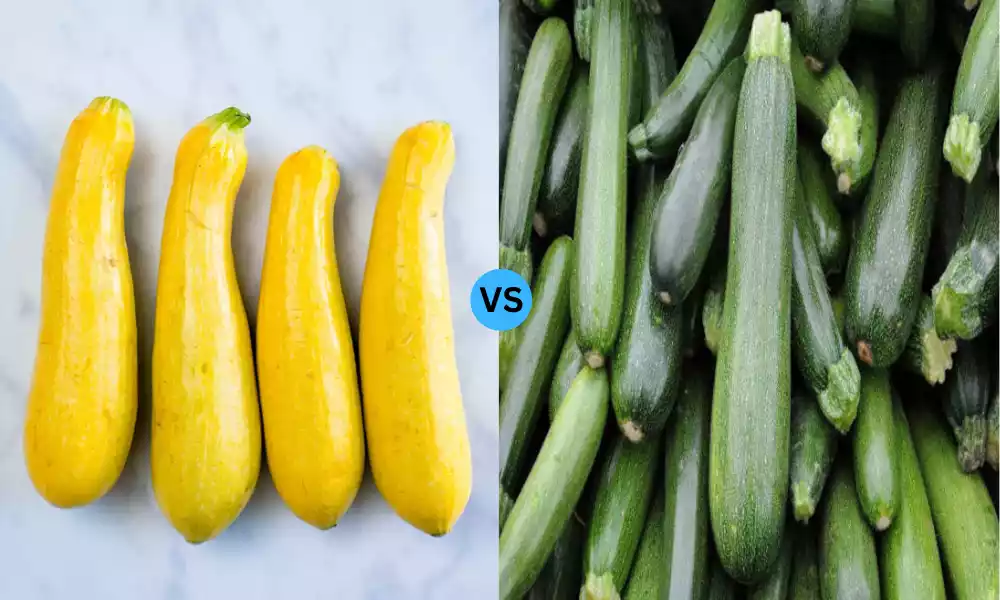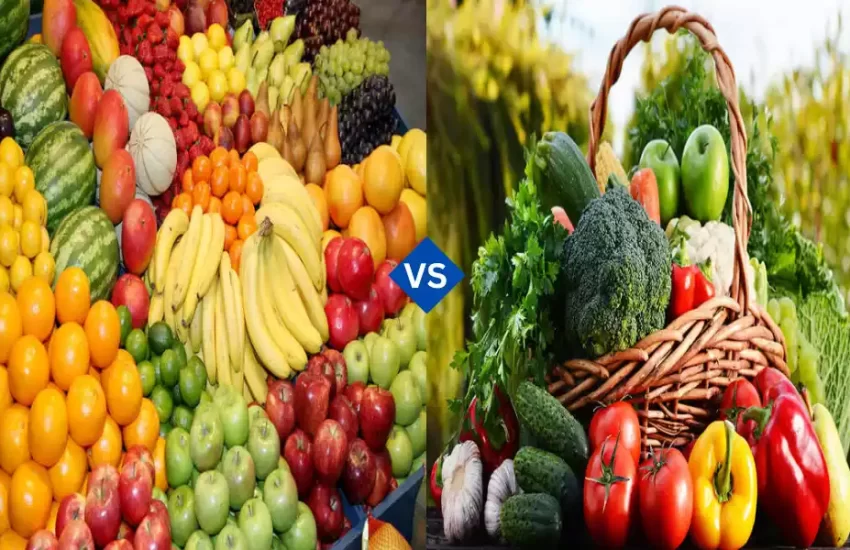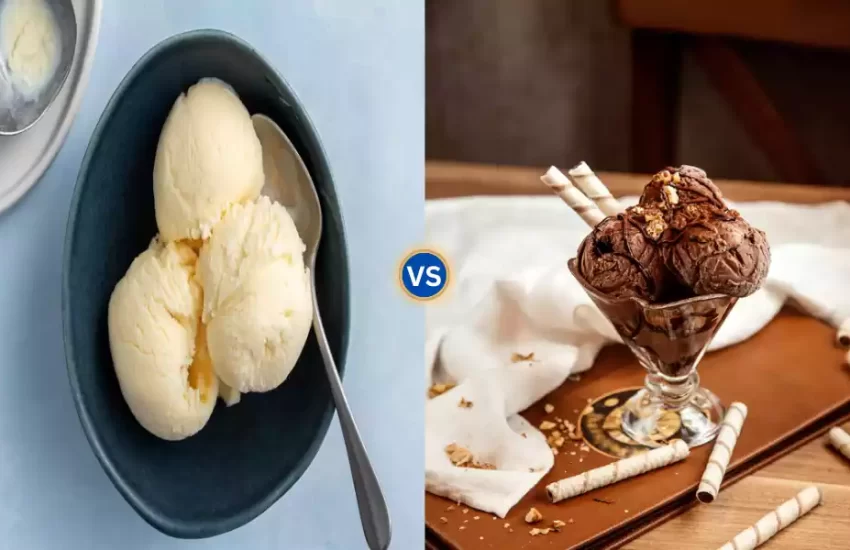Difference Between Squash vs Zucchini
Squash and zucchini are both members of the Cucurbitaceae family, widely known for their culinary uses and health benefits. Squash, a term that often encompasses a variety of species, can be divided into summer and winter types, each with distinct flavors and textures. Summer squashes are harvested when immature, having tender, edible rinds, and include varieties like yellow squash and zucchini.
Zucchini, a type of summer squash, is characterized by its elongated shape, smooth skin, and mild, slightly sweet flavor. It’s versatile in cooking and used in dishes ranging from salads to baked goods.
Winter squash, on the other hand, has harder skin, a longer shelf life, and a sweet, nuttier flavor, suitable for heartier dishes. Both squash and zucchini are nutrient-rich, containing vitamins, minerals, and fiber, making them a healthy addition to any diet.
Definition of Squash
Squash refers to a group of plants from the genus Cucurbita, belonging to the gourd family Cucurbitaceae. These plants are typically grown for their edible fruit. The term “squash” can be used to describe both summer and winter varieties.
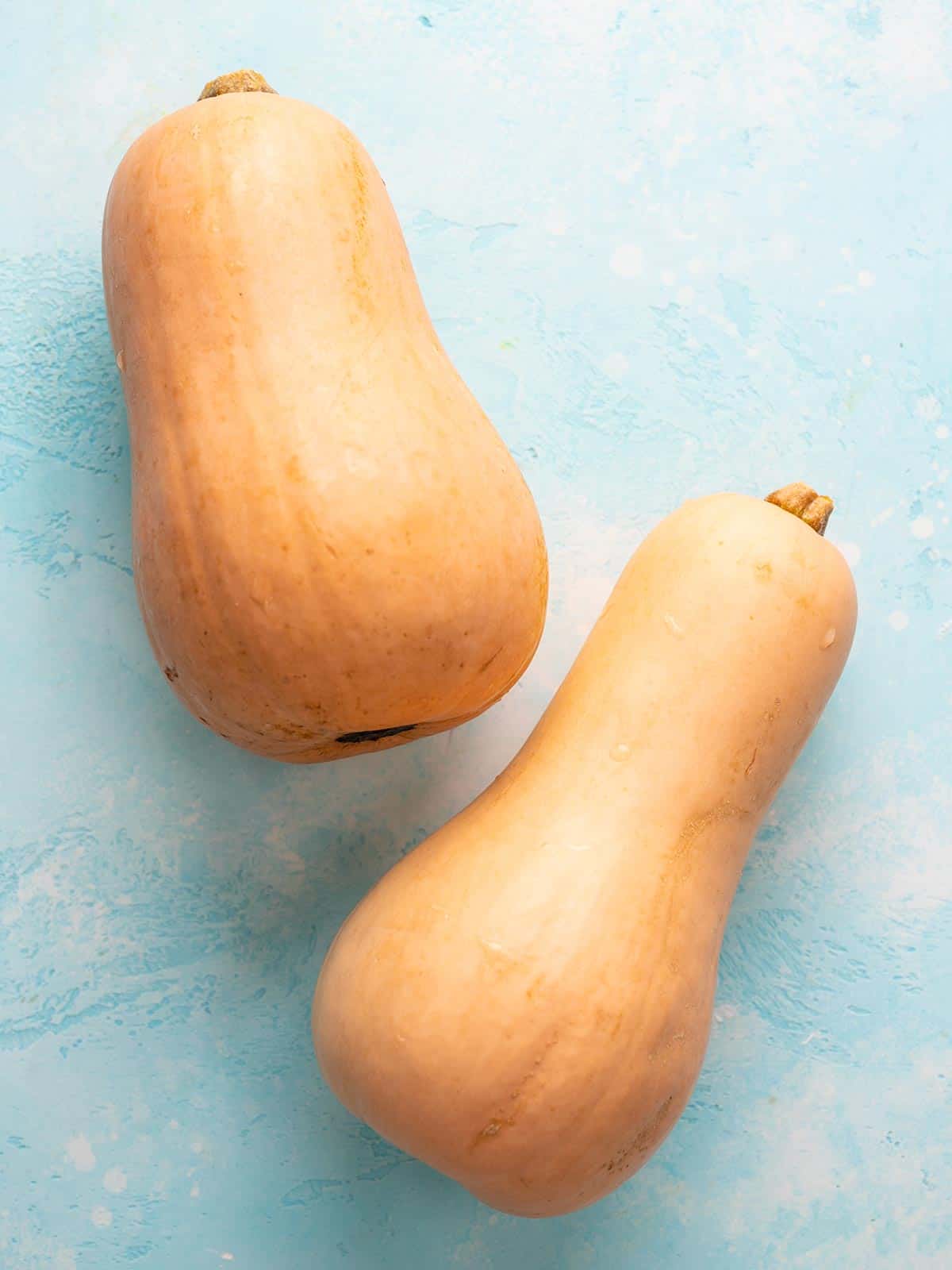
Summer squash, like zucchini and yellow squash, are harvested when immature, meaning their rind is still tender and edible. Winter squash, such as butternut, acorn, and spaghetti squash, are harvested when fully mature, resulting in a hard rind and a longer shelf life.
Squashes come in a variety of shapes, sizes, and colors, and are known for their rich nutritional profile, including vitamins, minerals, and fiber. They are a versatile ingredient in many cuisines, used in a wide range of dishes from savory to sweet.
Definition of Zucchini
Zucchini, also known as courgette, is a type of summer squash that belongs to the species Cucurbita pepo. It’s a member of the gourd family, Cucurbitaceae, which includes cucumbers and melons. Zucchinis are usually harvested when they’re still immature, at which point their skin is tender and edible. They are typically elongated, with smooth, thin skin that can be green or yellow in color.
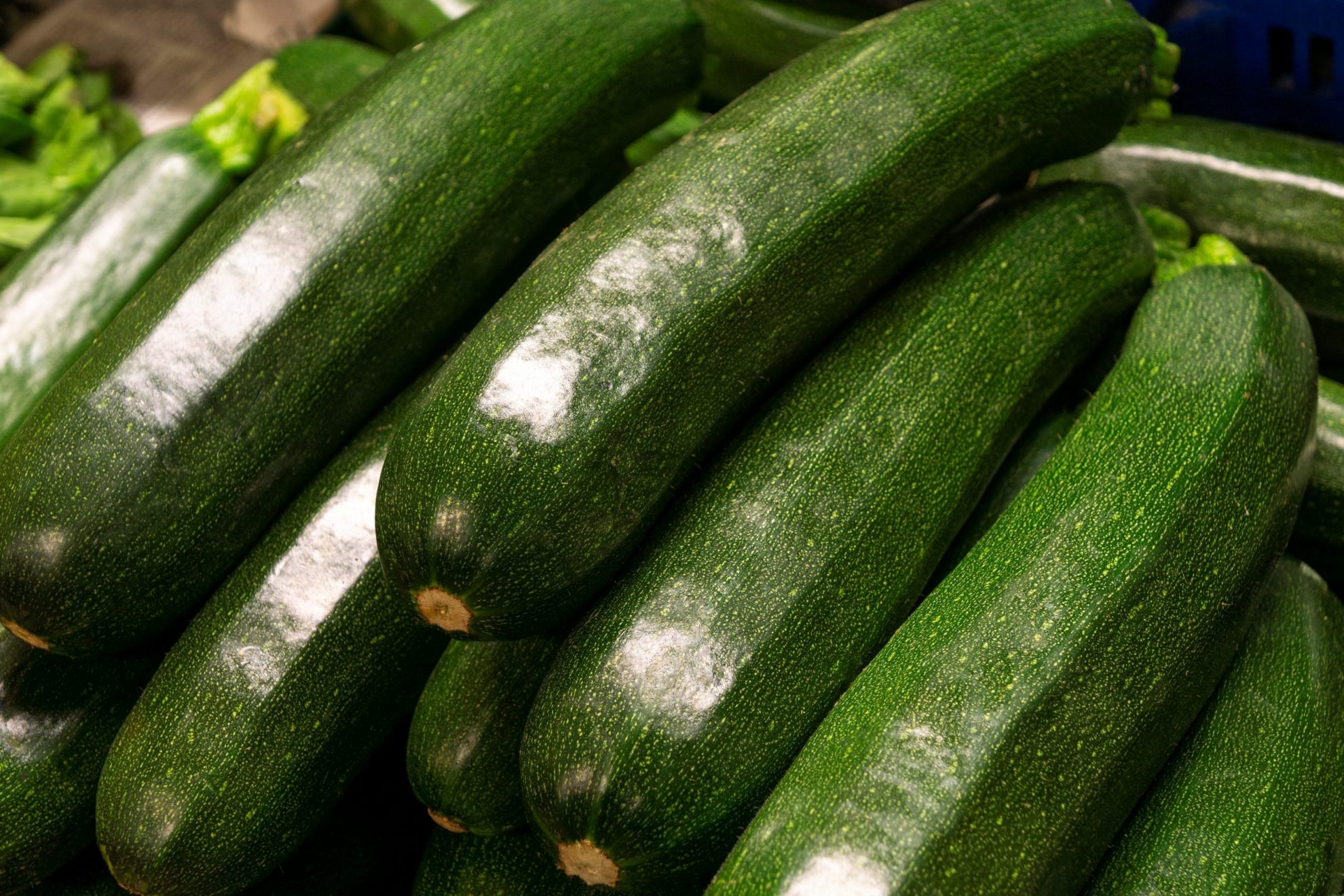
Zucchinis have a mild, slightly sweet flavor, making them a versatile ingredient in a variety of culinary dishes. They can be eaten raw in salads, grilled, baked, sautéed, or used in stir-fries. Zucchinis are also popular in baking, often used in breads and cakes.
Nutritionally, zucchinis are low in calories but high in vitamins (especially vitamin C and B vitamins), minerals, and dietary fiber. They also contain valuable antioxidants and contribute to hydration due to their high water content.
Differences between Squash vs Zucchini
Squash and zucchini, while closely related and often used interchangeably in cooking, have several distinct differences:
- Botanical Classification: Both squash and zucchini belong to the same family (Cucurbitaceae) and genus (Cucurbita). Squash can refer to several species within this genus, while zucchini (Cucurbita pepo) is a specific type of summer squash.
- Varieties and Types:
- Squash: Includes both summer and winter varieties. Summer squashes are harvested when immature and have tender, edible skins. They include varieties like yellow crookneck and pattypan squash. Winter squashes, like butternut, acorn, and spaghetti squash, are harvested when fully mature, featuring harder skins and a longer shelf life.
- Zucchini: A type of summer squash, characterized by its long, cylindrical shape, usually green but can also be yellow.
- Flavor and Texture:
- Squash: The flavor and texture vary significantly between summer and winter varieties. Summer squashes have a mild, delicate flavor and softer texture, whereas winter squashes are sweeter and heartier.
- Zucchini: Generally has a mild, slightly sweet flavor with a tender texture, similar to other summer squashes but with its own subtle differences.
- Culinary Uses:
- Squash: Both summer and winter squashes are versatile in cooking. Summer squashes are great for quick-cooking methods like sautéing or grilling. Winter squashes are suited for longer cooking times, like roasting or stewing.
- Zucchini: Commonly used in a variety of dishes, from salads and stir-fries to breads and desserts. It’s known for its ability to blend well with a wide range of flavors.
- Nutritional Content:
- Squash: Nutritional content varies. Generally, squashes are rich in vitamins, minerals, and fiber. Winter varieties tend to have higher sugar and carb content.
- Zucchini: Low in calories, high in vitamin C and B vitamins, and provides dietary fiber.
- Physical Appearance:
- Squash: Varies widely in shape, size, and color depending on the type.
- Zucchini: Usually elongated, with smooth skin that’s typically green or yellow.
While zucchini is a specific type of squash, the term “squash” encompasses a wider range of varieties, each with unique characteristics in terms of taste, texture, culinary uses, and nutritional profiles.
Comparison Chart
Here is a comparison chart that highlights the differences and similarities between squash and zucchini in terms of their nutritional value and health benefits:
| Aspect | Squash | Zucchini |
|---|---|---|
| Vitamins | Rich in vitamins A, C, E, and B vitamins. | High in vitamin C, B6, riboflavin, and folate. |
| Minerals | Contains minerals like magnesium, potassium, and manganese. | Provides potassium, manganese, and magnesium. |
| Antioxidants | High in beta-carotene, lutein, and zeaxanthin. | Rich in carotenoids like lutein, zeaxanthin, and beta-carotene. |
| Dietary Fiber | Good source of fiber, and beneficial for digestion. | Also high in fiber, aiding in digestion. |
| Caloric Content | Generally low in calories, varies among types. | Very low in calories, ideal for weight management. |
| Water Content | High water content, especially in summer varieties. | Very high in water, hydrating and filling. |
| Blood Sugar Control | Fiber helps stabilize blood sugar levels. | Fiber contributes to blood sugar stabilization. |
| Heart Health | Potassium and fiber support heart health. | Potassium, fiber, and antioxidants benefit heart health. |
| Eye Health | Antioxidants promote eye health. | Lutein and zeaxanthin are beneficial for the eyes. |
| Skin Health | Vitamins A and C support skin health. | Also contains vitamins good for the skin. |
| Immune Function | Vitamin C boosts the immune system. | Vitamin C is key for immune function. |
| Anti-Inflammatory | Contains anti-inflammatory compounds. | Anti-inflammatory properties due to antioxidants. |
This chart provides a comparative overview of the nutritional and health benefits of squash and zucchini, showing how they are both valuable additions to a healthy diet, each bringing its unique set of nutrients and benefits.
Culinary Uses
Squash and zucchini are incredibly versatile in the kitchen, each offering a range of culinary uses due to their distinct textures and flavors:
- Squash:
- Summer Squash:
- Sautéing and Grilling: Thinly sliced or chopped, summer squash can be quickly sautéed or grilled, making a delicious side dish.
- Stir-Fries: Adds a mild, sweet flavor and tender texture to stir-fries.
- Stuffed Squash: Larger varieties can be hollowed out and stuffed with a mixture of grains, meats, or other vegetables.
- Salads and Slaws: Raw summer squash can be shaved or spiralized into salads or slaws for a crunchy, fresh addition.
- Winter Squash:
- Roasting: Brings out the natural sweetness of the squash. It can be served as a side dish, pureed for soups, or incorporated into casseroles.
- Soups and Stews: Adds richness and depth, especially when pureed into soups like butternut squash soup.
- Baking: Squash can be baked into pies, breads, and muffins, particularly varieties like pumpkin and butternut squash.
- Mashed or Pureed: Serves as a healthier alternative to mashed potatoes.
- Summer Squash:
- Zucchini:
- Grilling and Sautéing: Sliced or diced zucchini can be grilled or sautéed for a quick and healthy side dish.
- Baking: Often used in breads, muffins, and cakes, adding moisture and a subtle sweetness.
- Spiralized or Ribboned: As a low-carb alternative to pasta, zucchini can be spiralized into “zoodles” or cut into thin ribbons.
- Stuffed Zucchini: Hollowed out and filled with various fillings, then baked.
- Fritters and Pancakes: Grated zucchini can be used in savory fritters or pancakes, mixed with flour and eggs.
- Raw in Salads: Thinly sliced or ribboned zucchini adds a fresh, crunchy element to salads.
Both squash and zucchini can be seasoned and enhanced with a variety of herbs, spices, and other flavorings, making them adaptable to many different cuisines and dietary preferences. Their ability to be cooked in multiple ways (roasted, steamed, grilled, etc.) further adds to their culinary versatility.
Healthy Benefits of Squash
Squash, in its various forms, offers numerous health benefits due to its rich nutrient profile and beneficial plant compounds.
Here are some of the key health benefits associated with consuming squash:
- Rich in Vitamins and Minerals:
- Squash is high in vitamins A, C, and E, and contains a good amount of B vitamins like folate.
- It’s also a source of essential minerals such as magnesium, potassium, and manganese.
- High in Antioxidants:
- Squash is loaded with antioxidants like beta-carotene, lutein, zeaxanthin, and vitamin C, which help protect your body from oxidative stress and may reduce the risk of certain chronic diseases.
- Supports Good Eye Health:
- The antioxidants, particularly lutein and zeaxanthin in squash, are beneficial for eye health and may help prevent age-related macular degeneration.
- Aids in Digestion:
- Squash is a good source of dietary fiber, which is important for digestive health. Fiber helps to maintain regular bowel movements and can prevent constipation.
- May Improve Heart Health:
- The fiber, potassium, vitamin C, and choline content in squash all support heart health. Potassium can help manage blood pressure levels, while fiber helps in lowering cholesterol.
- Supports Healthy Skin:
- Vitamins A and C, found abundantly in squash, are vital for skin health. They contribute to the skin’s collagen production and offer protection against skin damage.
- May Aid in Weight Loss:
- Low in calories and high in water, squash can be a great addition to a weight-loss diet. It helps in creating a feeling of fullness without adding too many calories.
- Boosts Immune Function:
- The high vitamin C content in squash helps strengthen the immune system and can aid in reducing the duration of colds.
- May Have Anti-Cancer Properties:
- Certain compounds in squash, like beta-carotene, have been studied for their potential anti-cancer effects, though more research is needed in this area.
- Blood Sugar Regulation:
- The type of fiber found in squash can help in regulating blood sugar levels, making it a good dietary choice for people with diabetes or those at risk.
Incorporating squash into your diet can contribute to overall health and wellness, given its wide range of beneficial nutrients and properties. As with any food, it’s most beneficial when included as part of a balanced and varied diet.
Healthy Benefits of Zucchini
Zucchini, a popular summer squash, offers a variety of health benefits due to its rich nutrient content and beneficial plant compounds.
Here are some key health benefits of including zucchini in your diet:
- Rich in Nutrients:
- Zucchini is low in calories but high in essential nutrients like vitamins C and K, potassium, manganese, and antioxidants.
- High in Antioxidants:
- It contains antioxidants such as lutein, zeaxanthin, and beta-carotene, which can help protect your body against oxidative stress and may reduce the risk of certain chronic diseases.
- Promotes Healthy Digestion:
- Zucchini is a good source of water and fiber, which can help improve digestive health by reducing the risk of constipation and promoting regular bowel movements.
- Heart Health:
- The fiber, potassium, and magnesium in zucchini can contribute to heart health. Potassium helps manage blood pressure levels, while fiber can aid in lowering cholesterol.
- May Aid in Weight Management:
- Due to its high water content and low-calorie count, zucchini can be a filling, nutrient-rich option for those looking to manage or lose weight.
- Blood Sugar Levels:
- The fiber in zucchini can help stabilize blood sugar levels, making it a beneficial food for those with diabetes or insulin resistance.
- Eye Health:
- Antioxidants like lutein and zeaxanthin in zucchini are essential for eye health and may help prevent age-related eye conditions.
- Improved Energy Levels:
- Being a good source of B vitamins, particularly folate and B6, zucchini can help boost energy production in the body.
- Skin Protection:
- The vitamin C and beta-carotene in zucchini can contribute to healthy skin by protecting against sun damage and improving skin hydration.
- Anti-Inflammatory Properties:
- The presence of anti-inflammatory compounds can help reduce inflammation in the body, potentially benefiting conditions like arthritis.
- Cancer Prevention:
- While more research is needed, the antioxidants and anti-inflammatory compounds in zucchini may lower the risk of certain types of cancer.
Including zucchini in your diet can be both a delicious and healthful choice, contributing to overall well-being and nutrition. Its versatility in cooking also makes it easy to incorporate into a wide range of dishes.
Conclusion
Squash and zucchini are nutritious members of the Cucurbitaceae family, each offering unique health benefits. Squash, encompassing a variety of types, is versatile and nutrient-rich, with differences between summer and winter varieties in texture and taste.
Zucchini, a type of summer squash, stands out for its low-calorie count and high vitamin C content, making it ideal for a range of culinary uses. Both are excellent, healthful additions to a diet.
